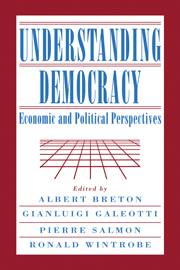11 - Components of the democratic ideal
Published online by Cambridge University Press: 05 December 2011
Summary
Introduction: Three types of middle ground
Our subject is the meaning of democracy. It is necessarily a complex one, because the term democracy means different things to different people. Sometimes it is identified with a particular decision rule, at other times it conjures up the spirit of an age. Often democracy is defined by reference to lists of criteria (such as regular elections, competitive parties, and a universal franchise), yet sometimes it is a comparative idea: the Athenian polis exemplified few characteristics on which most contemporary democrats would insist, but it was relatively democratic by comparison with other ancient Greek city-states. Many people understand democratic government in procedural terms; others insist that it requires substantive–usually egalitarian–distributive arrangements. Sometimes democracy connotes little more than an oppositional ethic, at other times it is taken to require republican self-government, robustly understood.
Given this multitude of meanings, any defense of a particular understanding reasonably begins with an account of why an author proceeds in one way rather than another and who he or she seeks to persuade. My goal here is to sketch a view of democracy that stakes out a middle ground in three different debates about democracy. These are the debate between procedural and substantive democrats, the debate between those who defend democracy as an ideal type and those who think of the term as contextually defined, and the debate between those who think of democracy in purely instrumental terms and those who see it as an intrinsically valuable, if not the most valuable, political good.
- Type
- Chapter
- Information
- Understanding DemocracyEconomic and Political Perspectives, pp. 211 - 248Publisher: Cambridge University PressPrint publication year: 1997
- 1
- Cited by

